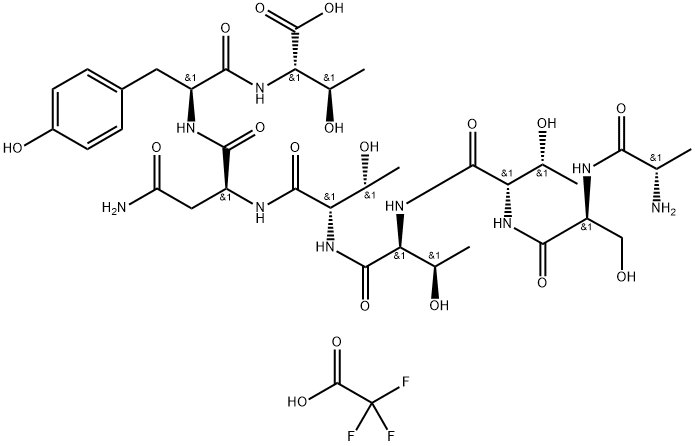1610056-01-3
中文名稱
1610056-01-3
英文名稱
Peptide T TFA
CAS
1610056-01-3
分子式
C37H56F3N9O18
分子量
971.9
MOL 文件
1610056-01-3.mol
 1610056-01-3 結(jié)構(gòu)式
1610056-01-3 結(jié)構(gòu)式
1610056-01-3價(jià)格(試劑級(jí))
| 報(bào)價(jià)日期 | 產(chǎn)品編號(hào) | 產(chǎn)品名稱 | CAS號(hào) | 包裝 | 價(jià)格 |
| 2023/03/20 | HY-P0272A | 1610056-01-3 Peptide T TFA | 1610056-01-3 | 1mg | 1000元 |
| 2023/03/20 | HY-P0272A | 1610056-01-3 Peptide T TFA | 1610056-01-3 | 5mg | 2900元 |
| 2023/03/20 | HY-P0272A | 1610056-01-3 Peptide T TFA | 1610056-01-3 | 10mg | 4900元 |
常見問題列表
生物活性
Peptide T (TFA) 是源自HIV-1 gp120的V2區(qū)的八肽。 Peptide T是 CD4 受體的配體,可阻止 HIV 與CD4受體結(jié)合。靶點(diǎn)
CD4, HIV
體外研究
Peptide T acts to block viral entry as it inhibits in the MAGI cell assay and blocks infection in the luciferase reporter assay using HIV virions pseudotyped with ADA envelope. Peptide T selectively inhibits HIV replication using chemokine receptor CCR5 compared to CXC4. Peptide T at 10 -8 M induces IL-10 production by the human Th2 cell line and PBMC. Also peptide T at 10 -9 M concentration significantly inhibits IFN-g production by PBMC.
體內(nèi)研究
Peptide T is administered subcutaneously at different doses and phases of the experimental autoimmune encephalomyelitis (EAE) disease, but Peptide T neither prevents nor ameliorates EAE.